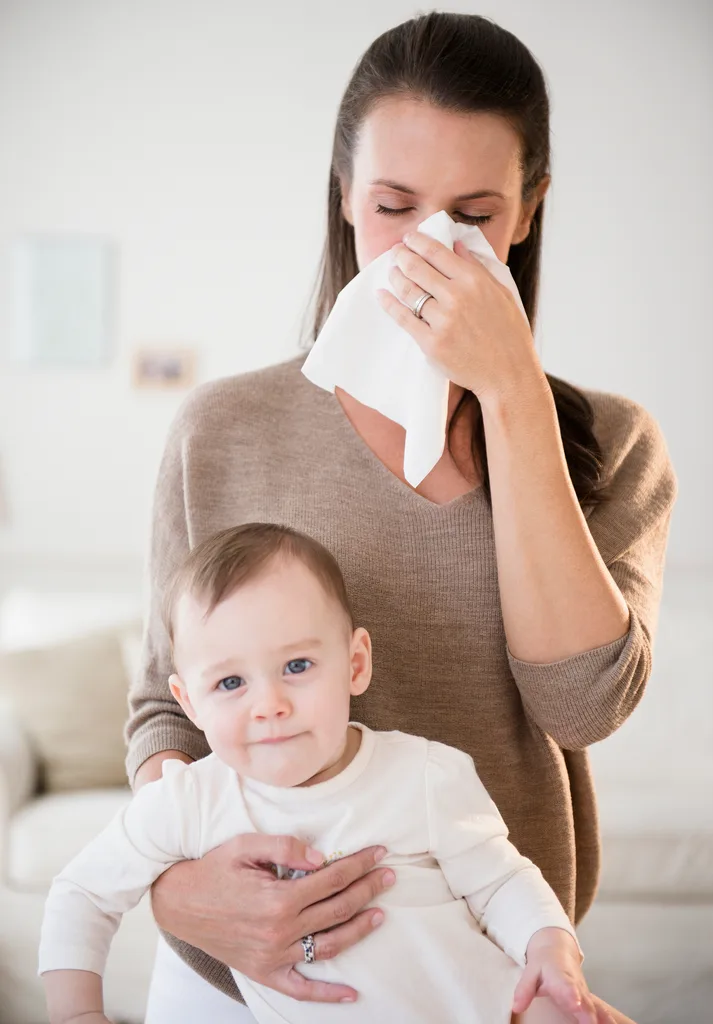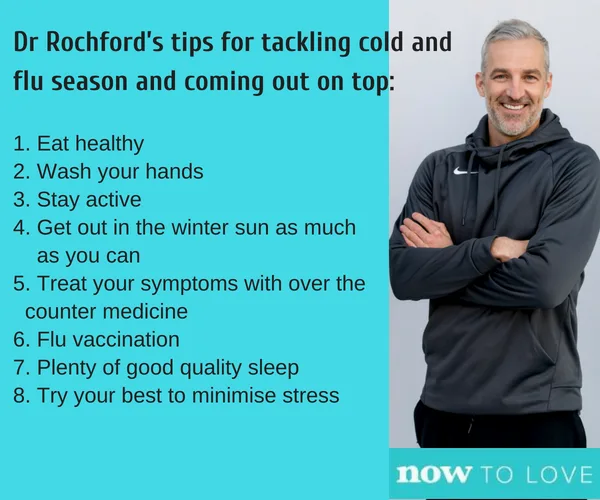Each year, Aussie parents brace themselves for the colder weather which is bound to bring the runny noses, lack of energy, sore throats and lingering coughs that can mean only one thing: cold and flu season is here.
If you’ve got a family, you might want to stock up on the tissues, because while kids may not want to share their toys, there’s one thing they will always share …. germs!
A study by Codral has found that Australians who have children in their household are (59 percent) more likely than those who do not (31 percent) to be currently suffering or have suffered a cold or flu in the last 4 weeks.

A study by Codral has found that Australians who have children in their household are more likely than those who do not.
So why is winter so tricky?
Dad-of-three Dr Andrew Rochford explains: “During the cooler months, you’re far more likely to suffer from a common cold or the flu, as viruses thrive in colder temperatures.
“They’re also more easily spread from person to person as the family huddle inside with windows and doors closed to stay warm.
“The symptoms of cold and flu are the result of your body’s immune system trying to fight off the virus. These symptoms typically have us suffering from a lack of energy but there are ways we can manage our symptoms, like with over the counter medicine.”
Lack of energy is right. With most parents stretched energy-wise with family and work commitments, recovering from a cold or flu can zap resources that are probably already diminished.
The Codral study found of those who experienced a lack of energy associated with cold or flu symptoms, 51 percent admitted to not being able to keep up with household chores, 38 percent took time off work, 34 percent missed social events while 32 percent were not able to exercise. All nightmare situations if you have a family to look after as well.
There are ways you can try to dodge that hit, though.

Health-conscious dads, Dr Andrew Rochford and Sam Wood are sharing their tips for taking on flu season.
Fitness expert and dad-of-two, Sam Wood takes on winter by making sure that he’s energy supply is topped up from the start.
“The first thing I do is up my nutrition-game and water intake to stay hydrated,” says Wood.
“What you eat has a serious impact on your immunity, which is important to keep your energy levels up, especially now that we’re entering peak cold and flu season. A balanced diet with plenty of fresh fruits, vegetables and healthy fats is essential – go for foods that are rich in vitamin C; think berries, broccoli, cauliflower, brussel sprouts. If you are suffering from a cold and flu I suggest vegetable-based soups and broths.”
Dr Rochford agrees, saying that good nutrition helps ensure that your families immune system is functioning at an optimal level, which is super important when the kids are coming home from a classroom full of winter lurgies.
“Also staying active, which I admit isn’t easy to do during the cooler weather, is important for the immune system,” says Dr Rochford. “Get outside, get some sun when possible, stay hydrated and avoid too many late nights.”
It probably comes as no surprise to hear that Wood is also a fan of exercise: “Most people think that exercise will make them feel more tired, but it’s the opposite, it energises you!” he says.
“If a cold or flu has zapped your supply, swap out intense exercise for light activity like a slow jog or a walk for a burst of energy when you’re feeling tired and sluggish.”

“Make sure you give yourself time to rest and listen to your body too,” says Dr Andrew Rochford.
Don’t welcome the bugs in!
On top of maintaining a healthy diet, and trying to get as much sleep as possible, it’s important to try and keep the house as virus ‘un-friendly’ as possible.
“Opening the curtains, letting the sun in, getting outside as much as possible. Hand washing is also a valuable weapon against getting sick. Make sure you take the time to wash your hands with warm running water and soap,” says Dr Rochford.
How can parents cope if they do get sick?
Despite your best intentions, it will probably come to pass that you will catch a bug or two. If you do, you’re sure to want to get back on your feet as quickly as possible.
“Make sure you give yourself time to rest and listen to your body too. Don’t be afraid to talk to your pharmacist about treating symptoms or trying over the counter medicine like a cold and flu tablet,” says Dr Rochford.
“Avoid spreading it around too, the worst is when a virus spends weeks going from one family member to the next. Sometimes it feels like it will never end!”



